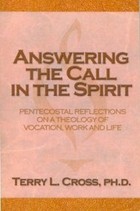Terry L. Cross: Answering the Call in the Spirit: Pentecostal Reflections on a Theology of Vocation, Work and Life
 Terry L. Cross, Answering the Call in the Spirit: Pentecostal Reflections on a Theology of Vocation, Work and Life (Cleveland, TN: Lee University Press, 2007), 164 pages, ISBN 9781596843301.
Terry L. Cross, Answering the Call in the Spirit: Pentecostal Reflections on a Theology of Vocation, Work and Life (Cleveland, TN: Lee University Press, 2007), 164 pages, ISBN 9781596843301.
The author’s stated purpose is “expanding the definition of calling” (p. 6) as understood in traditional Pentecostal theology and to “show that a theology of calling and work requires a theology of the Spirit and giftings” (p. 17). Terry Cross informs readers that “This project [the Poiema Project, funded by a Lilly Endowment] began in a committee meeting. Originally, the faculty and staff of Lee University were the intended readers for his book”—which consists of “a discussion regarding calling within the context of [a] Christian liberal arts university” (p. 7).
Cross’ discussion regarding Pentecostal definitions and theology of vocation is not substantive—only a small portion of the text addresses these topics. The author maintains that historically, Pentecostal reflection on theology of call is limited, referring only to ministerial call. Cross does not approach the larger discussion of vocation from a Pentecostal perspective, supporting this decision based on his assertion that not much material is available.

Terry L. Cross
Although the author devotes a chapter to “A Theology of Work,” one weakness of the text is the omission of definitions for those terms similar to or related to vocation and call, such as profession, career, job, etc. An inclusion and comparison of these definitions would facilitate readers’ understanding of the precise relationships among these terms, distinctions in their meanings and in the way these terms are understood in Pentecostal and other Christian traditions.
Cross states that “‘Calling’ has a rather univocal definition for Pentecostals. It usually refers to God’s communication to preachers to make full-time ministry their career” (p. 45). The “usually” here is troubling and raises the question: What if the text included a more comprehensive discussion, based on further research, of call/calling as understood in the Pentecostal tradition? Would this result in uncovering a deeper or more diverse understanding of call, even though resources for the research of call in that tradition may be limited?
Category: Fall 2008, Ministry, Pneuma Review


